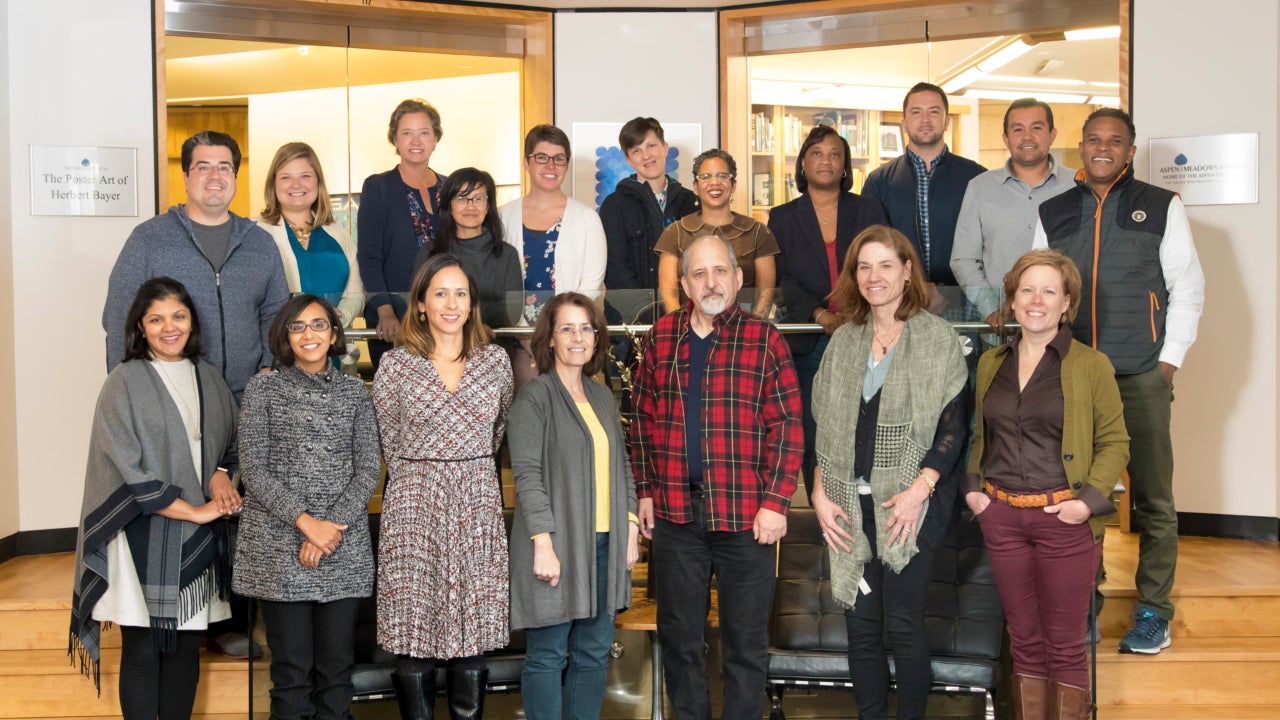Job Quality Fellow, Class of 2017-18
President, SEIU Local 2015

What does job quality mean to you, and why is it important?
We’re at a moment when it’s critical to develop a common vision of job quality for our country. This vision is essential to support the jobs of today and the jobs of tomorrow.
Job quality speaks to how we consider the worker as a whole person – ensuring that workers have dignity and respect in the workplace, that they have a voice on the job, and that their opinions and expertise are valued. A quality job allows workers to provide for their families, save for their retirement in comfort, and have confidence in the contributions they have made to their community.
Job quality matters now more than ever. Our largest generation is aging and is continuing to live and work longer than in previous generations. We also have a new cohort of younger people entering the workforce who are excited to contribute to their workplaces and communities. The convergence of these trends requires us to have a long-term vision that guides strategies for shared prosperity across our nation’s workforce.
Describe your organization’s work and how it’s connected to job quality.
For nine years, I have served as president of Service Employees International Union Local 2015 (SEIU Local 2015) in California, representing more than 350,000 home care, skilled nursing facility, and assisted living center workers. SEIU Local 2015 is the largest long-term care union in California and the second largest SEIU Local nationwide.
With 46 million Americans older than 65, and an average of 10,000 baby boomers hitting that milestone every day, the demand for long-term care workers is growing quickly. At the same time, long-term care workers face numerous challenges at work. Our caregiving workforce is underpaid, lacks access to workplace benefits, and has few opportunities to improve skills through training. The National Employment Law Project reports, for instance, that nearly one in five home care workers are paid less than the minimum wage and that 80 percent work unpaid overtime. Furthermore, home care workers rarely have the potential to come together to improve their working conditions because they often work in isolation, in private homes, and on temporary assignments.
At SEIU Local 2015, we’re thinking about the workers who are necessary to support our large aging generation and the policies and practices that need to be in place to ensure that these workers are afforded the dignity, respect, and economic security that this important work should provide. Our members have the same dreams, hopes, and optimism for a prosperous future that every worker shares. What sets them apart is that their profession is to care for someone every single day—and we, in turn, do our part to ensure their work is valued and respected in the workplace.
SEIU Local 2015 is guided by a mission and vision centered on improving the lives of long-term care workers. As a union, our first and primary responsibility to our members is collective bargaining, and we have seen tangible outcomes from these efforts. We have helped our workers secure increases in wages with extended overtime in facilities across the state. We have also organized and fought for changes to local and state policies that affect our members and residents across California. For example, we helped lead the Fight for $15, which benefited more than 5.6 million workers in California and improved the minimum wage and living standards not just for our members, but for all working families in California. We have also raised statewide standards for patient care by successfully fighting to increase the required nursing hours per patient in a skilled nursing facility, ensuring that our consumers and patients receive the quality care and attention they deserve.
One of our strategies is to expand job training and career development opportunities for home care workers, which improves job quality for workers and translates to higher quality care for patients. We believe that highly trained home care workers will help to reduce long-term health care costs and improve the overall quality of care for patients. Through a grant from the Center for Medicaid and Medicare Innovation, we are working to study the effects of “integrated care teams,” in which home health care workers are embedded into patients’ long-term care teams along with doctors, nurses, and other medical professionals.
Just from our initial data, we’ve seen evidence that our hypothesis is correct: Training a home care worker and integrating him or her into patients’ care teams helps to minimize the number of emergency room visits and the length of hospital stays. It also creates a frontline “first responder” who can make sure patients are taking medication, complying with nutrition suggestions from their physicians, and getting the exercise they need to stay healthy.
We’ve seen that, beyond the impact integrated care teams have on the health care system, there is also an impact on the confidence of the home care worker. With the increased training home care workers receive, they feel entirely more equipped to be advocates on behalf of their patients. They also feel more confident that their work matters and has value, and they believe that training should be an important part of the home care workforce of the future.
As we think about the future of work and job quality, we aim to champion both the professional and personal development of our members and improve their lives and communities through our work. Beyond the economic value of SEIU Local 2015 to our members, our union provides an opportunity for fellowship among long-term care workers. Our members work both in skilled nursing facilities and individually in home environments with long hours, tough work, and compassion for their patients. Our union provides them an opportunity to connect with and learn from their colleagues, whom they may not see regularly. I’ve been told countless stories of friendships that have emerged and bonds that have grown from our members supporting each other in their personal lives.
In the next few years, what are SEIU Local 2015’s goals as they relate to improving job quality?
Our goals over the next few years involve creating more job stability for California’s existing long-term care workers, developing a clear career path with educational and advancement opportunities, and establishing a delivery system model with fully integrated care teams that include home care workers and other health care professionals.
In order to achieve more job stability, we are focusing not just on pay, but also on other factors that affect people’s ability to work with confidence. For instance, one of our priorities is to create new pathways to retirement by advocating for retirement savings programs for our historically excluded workers in the long-term care sector. We continue to advocate for effective opportunities for our members to grow wealth and secure their futures. We are also prioritizing how technological advancement and disruption may affect job quality and job accessibility for long-term care workers. We see this moment of technological change as an opportunity to create new digital products that will allow caregivers to perform their work more effectively and productively.
Additionally, with the rise of managed care, care coordination, and care integration, the US health care delivery system has the potential to continue to undergo considerable change and create opportunity for job quality improvement for long-term care workers. Over the next few years, we will continue to advocate for policies to advance care integration teams that include home care workers. This means we will consider how we develop workers so that they get the skills they need and the opportunities for advancement they deserve. For this reason, a major advocacy priority is to advance state and national training standards in the sector of non-medical home care, create apprenticeship programs for home care workers, and develop career ladders where increases in skills and responsibilities are tied to improved compensation and opportunities for career advancement.
Describe the experience and perspective you bring to the Job Quality Fellowship.
In addition to my role as president of SEIU Local 2015, I recently completed my four-year tenure as president of SEIU California State Council. In that role, I focused my efforts on a broad set of goals related to job quality across industries, including raising the state minimum wage, winning paid time off, creating innovative retirement solutions, enhancing workplace protections related to immigration, and advocating for regional housing and transportation solutions that make job choices easier.
In both of my roles, I have seen firsthand how partnerships across labor, business, government, and community are key to advancing job quality at scale. As a fellow, I offer insights on my experiences building partnerships across sectors, including my perspective on how to break down and break through the common roadblocks that get in the way of effective partnerships. In the Fight for $15 campaign, we built a coalition of small businesses, nonprofits, and community-based organizations, along with city, county, and state governments, to develop solutions to raise the floor on wages and other job protections, while ensuring that our economies could continue to thrive. We have succeeded in creating and advocating for effective policies because we have worked with a broad group of stakeholders. I’ve learned that, while we’re incredibly effective as a union, we’re certainly stronger together with allies. SEIU Local 2015 has taken this to heart and formally adopted the motto, Together We Rise, because we believe in the collective power of our members and our community.
What do you hope to learn and achieve through the Job Quality Fellowship?
The organized labor community, along with businesses, government, nonprofits, philanthropists, and investors have big questions ahead of us. First and foremost, what kind of society do we want to build? And, central to that question, what does work mean, and how is it valued? Being a part of this fellowship connects me to people with whom I otherwise would not have an opportunity to talk about big questions. I would like to learn from other fellows: How do they experience the labor movement in their sectors or communities? What is the role of government in their sectors or communities? What should labor unions be doing differently to further improve job quality? How do business leaders consider job quality as a core part of their operational model?
Now is the time for these conversations to happen, and now is the time for us to envision the future that we want. I’m looking forward to building those relationships, having some difficult conversations, and asking ourselves questions that may not be popular to ask at home. Over the next year I think we will not only have a chance to ask the questions, but will also hopefully find the time to start to put together some solutions and create the pathway to the kind of society that our workers, families, and communities deserve.
Share now
Tweet “We’re at a moment when it’s critical to develop a common vision of job quality for our country. This vision is essential to support the jobs of today and the jobs of tomorrow.” @LaphonzaB
Tweet “A quality job allows workers to provide for their families, save for their retirement in comfort, and have confidence in the contributions they have made to their community.” @LaphonzaB
Tweet “Now is the time for these conversations to happen, and now is the time for us to envision the future that we want.” @LaphonzaB
Keep in touch
Learn how EOP is helping low- and moderate-income Americans connect to and thrive in a changing economy. Sign up to receive news about the Job Quality Fellows and other announcements via email.
We are grateful to the Ford Foundation and The Prudential Foundation for their support of this work.
